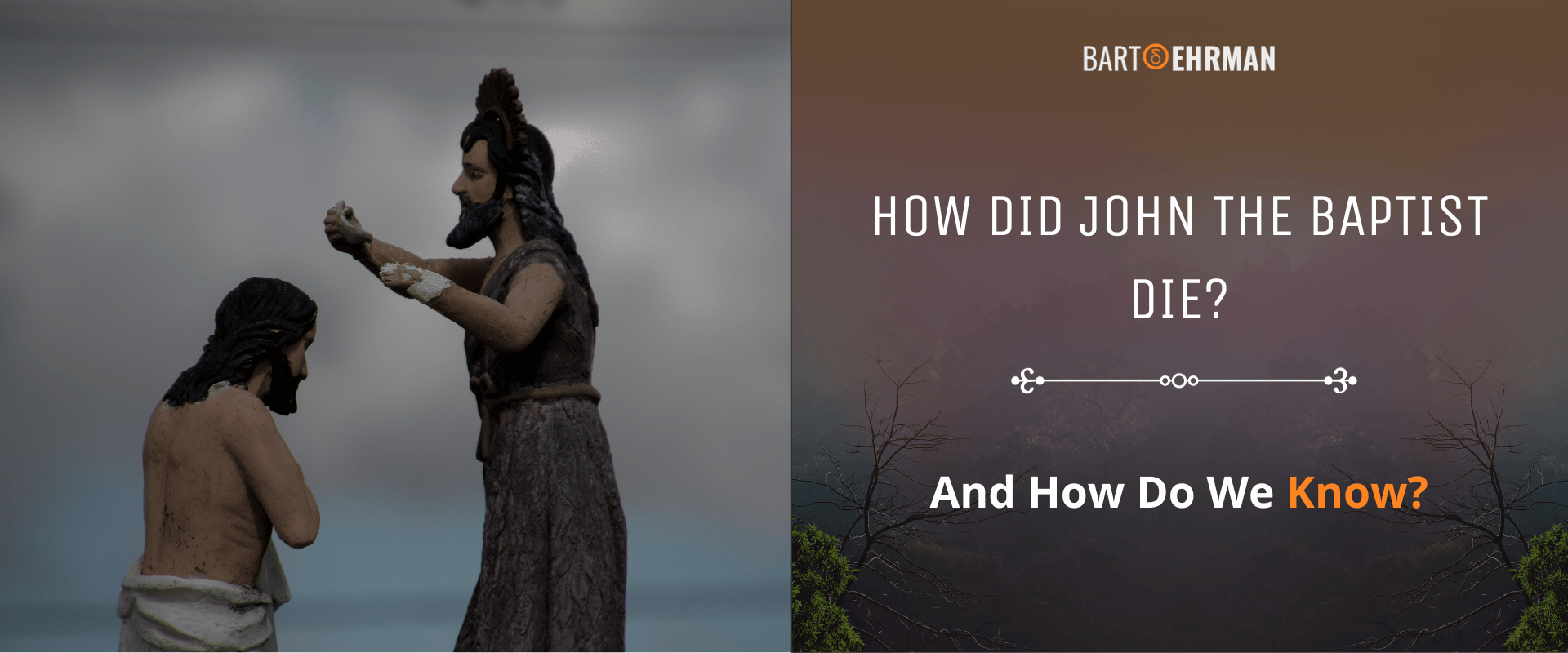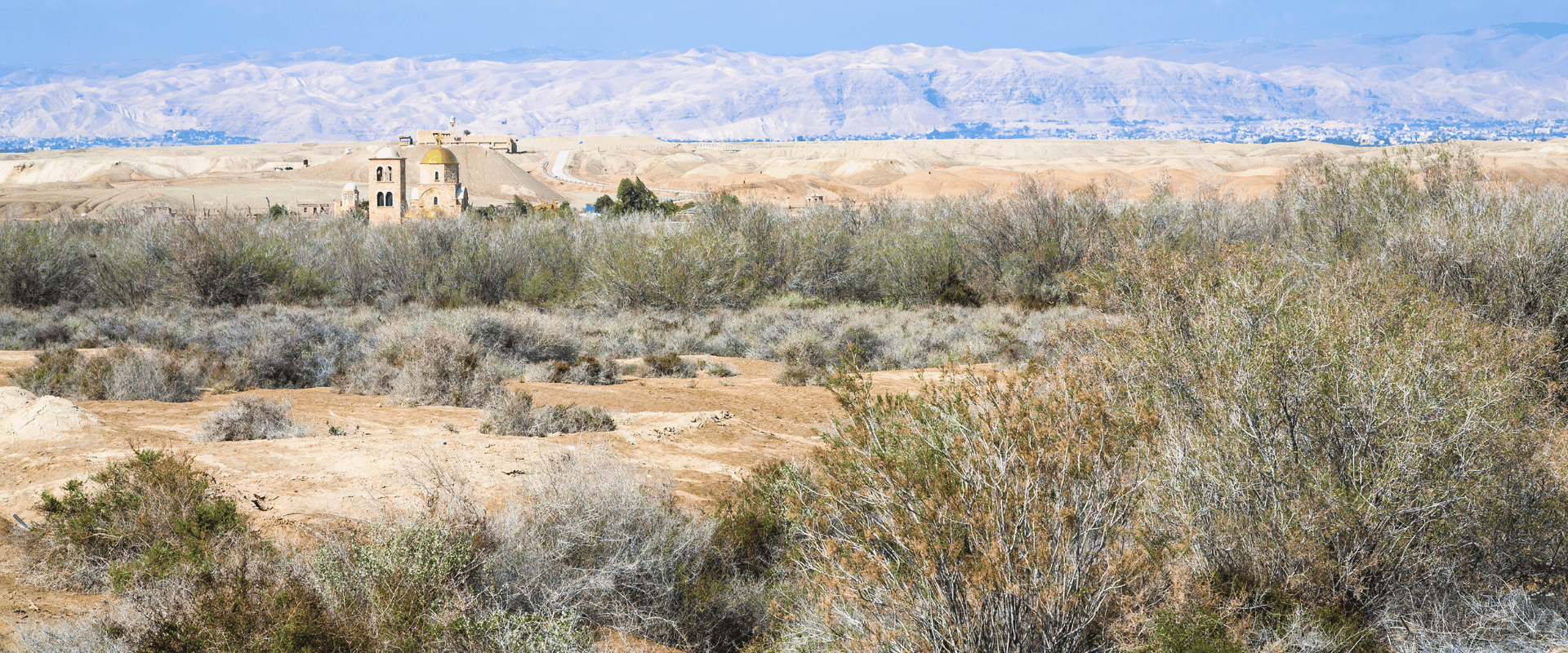How Did John the Baptist Die?

Written by Joshua Schachterle, Ph.D
Author | Professor | Scholar
Author | Professor | BE Contributor
Verified! See our editorial guidelines
Verified! See our guidelines
Edited by Laura Robinson, Ph.D.
Date written: September 30th, 2023
Disclaimer: The views and opinions expressed in this article belong to the author and do not necessarily match my own. - Dr. Bart D. Ehrman
How did John the Baptist die? Who killed John the Baptist and why? To what extent can historians be certain about the details of this event? In this article I’ll answer these questions and explore what we can know about John the Baptist’s death.

What do our Sources Say about John the Baptist’s Death?
Let’s start with what we know about John the Baptist from the Gospels.
Luke is the only Gospel to mention John’s birth. According to Luke 1, an angel appeared to Zechariah, a priest, and announced that he would have a son named John, who would play a significant role in preparing the way for the Messiah.
However, most scholars agree that Luke’s version is not a great basis for a historical reconstruction of John the Baptist’s life.
Nevertheless, it is clear that John was a contemporary of Jesus, possibly an older contemporary since his ministry started first. Scholar Joel Marcus says that the fact that John the Baptist baptizes Jesus indicates something interesting: Jesus was likely a follower of John the Baptist before beginning his own ministry.
The Gospels tell us that John was an ascetic, living in the desert, eating only locusts and wild honey and wearing a garment made of camel’s hair.
What Was John the Baptist’s Ministry About?
Matthew 3:7-12 gives us a good sampling of John’s preaching. In one scene, John speaks passionately about the coming end of the world. He says that all who are not righteous will be burned “with unquenchable fire” (3:12). From this, we can deduce that John the Baptist was an apocalyptic prophet.
In 1st-century Palestine where John lived, apocalyptic worldviews became increasingly common. The main thrust of these views was that the world had been corrupted by sin. For this reason, God would soon intervene to punish the wicked and reward those who had been righteously faithful. God would renew the world.
But how can one become righteous enough to escape God’s wrath? This is where baptism comes in. The Gospels say that John’s baptism fulfilled the purpose of showing repentance which would bring divine forgiveness for one’s sins (Luke 3:3).
So, who killed John the Baptist and why?
FREE COURSE!
WHY I AM NOT A CHRISTIAN
Raw, honest, and enlightening. Bart's story of why he deconverted from the Christian faith.
Over 6,000 enrolled!
How did John the Baptist Die in the Gospels?
The Synoptic Gospels say that a king named Herod Antipas arrested and killed John the Baptist. I’ll say more about him later.
In the Synoptic Gospels, Herod arrests John for a very specific reason. Herod has married Herodias, the wife of his brother Philip, and John publicly denounces him for this. Herod arrests John for his impudence and, according to Matthew 14, is tricked into beheading him by Herodias whose daughter asks for John the Baptist’s head on a platter.
How did John the Baptist Die According to Josephus?
Josephus was a 1st-century Jewish historian, living a few decades after John the Baptist’s death. He writes of a different dynamic between Herod and John the Baptist.
Josephus says John the Baptist was attracting such large crowds that Herod feared John might incite a rebellion. He arrests John and imprisons him at his fortress called Machaerus (in modern-day Mukawir, Jordan) and then has him executed. Unlike the Gospels, however, Josephus doesn’t explicitly say how John was killed.
In order to understand how he died, let’s look into the man who killed John the Baptist.
Who Was Herod Antipas?
In order to understand the motives of Herod Antipas, we have to go back to his father Herod the Great. He was born around 72 BCE in the region of Idumea, just south of Judea. Herod’s father was from the land of Edom. Nevertheless, his ancestors had converted to the Jewish religion and Herod himself was raised as a Jew.
When Herod the Great was a child, Rome conquered Judea, using Jewish client kings to rule on their behalf. Thanks to his father’s connection with the Roman dictator Julius Caesar, Herod rose up the ranks of government, ultimately becoming Rome’s client king in Judea. Herod may have been the king, but he had to follow Rome’s orders.
Herod the Great was known for his brutality. In fact, he executed several members of his own family, including his wife. However, he was later called “great” because of his ambitious building projects, including the massive Jerusalem Temple. His commitment to the Jewish faith was often questioned by Jews in his time, but he definitely considered himself a Jewish king.
Herod Antipas was Herod the Great’s son, born in 20 BCE when his father was the client king of Judea. When Herod the Great died in 4 BCE, Herod Antipas became the ruler of part of his father’s lands, namely Galilee and Perea.
Like his father, Herod Antipas ruled on behalf of Rome. This meant preventing any and all rebellion that would threaten Rom. However, as a Jewish king, he followed Jewish practices, including methods of capital punishment. What does this tell us about the death of John the Baptist?

Capital Punishment in First-Century Judea
Jesus was crucified. That’s how we know that he was executed by the Romans. Crucifixion was a common Roman punishment for those accused of sedition. In Jewish penal law, however, crucifixion is never mentioned. Since Herod Antipas considered himself a Jewish ruler, we can rule out crucifixion as a method by which John the Baptist would have been executed.
Early Jewish sources speak of four methods of execution for severe crimes - stoning, burning, strangulation, and decapitation. Flagellation, as a (usually) non-fatal form punishment was also used for less serious crimes. Let’s look at how and when each of the forms of capital punishment was prescribed and used.
Haim Hermann Cohn writes that stoning was sometimes a form of mob justice. That is, a group of people would collectively become angry at a person’s transgression and simply start throwing rocks at the offender. However, this punishment could also be prescribed by authorities and local people would volunteer to help. Since John was so popular with the local populace who might have participated in the stoning, we can probably rule that method out.
Burning is the prescribed punishment for two specific crimes in the book of Leviticus. First, if a man sleeps with both his wife and her mother and second, if the daughter of a priest becomes a prostitute. Since neither of these offenses apply to John, we can rule out burning.
Cohn notes that hanging is sometimes listed as a gentile method of execution in the Hebrew Bible. When hanging is mentioned, it usually refers to displaying a body after it has already been executed. In fact, there are so few references to hanging as a Jewish method of execution in the Hebrew Bible that it isn’t likely that John the Baptist was hanged.
This leaves decapitation as the most likely candidate, and that’s exactly what the Synoptic Gospels say occurred. While there are no instances of decapitation as a Jewish form of capital punishment in the Hebrew Bible, there are stories of soldiers being sent to take an enemy’s head (See 2 Kings 6:31-32, for example).
However, after Alexander the Great and Greek culture began to influence Judea, decapitation became more common as capital punishment. We can safely say that John the Baptist was probably beheaded.
However, the story in Matthew about Herodias’ using her daughter to trick Herod into doing it was likely fiction. Antipas might have inherited a propensity of brutality from his father and it was typical of rulers to execute rabble rousers like John the Baptist when they became popular.
How Did Jesus React to John the Baptist’s Death?
Did John the Baptist die before Jesus? Scholars are relatively sure he did, although they don’t know exactly how long. Since Jesus is estimated to have died around 30 CE, John might have been killed just a few years before that.
As I said before, some scholars have proposed that Jesus may have initially been a follower of John the Baptist. This explains Jesus’ apocalyptic orientation and why he allowed John to baptize him. So how did Jesus react to John’s death?
Jesus says a lot of very flattering things about John. In Matthew 11, for example, he says John was a prophet and the greatest man who ever lived. High praise indeed!
But the only reference to Jesus’ reaction to John’s death comes from a short, poignant passage in Matthew 14:13:
Now when Jesus heard [about John’s death], he withdrew from there in a boat to a deserted place by himself.
This passage is a subtly beautiful depiction of how important John was to Jesus and the depth of their connection.
Summing Up: How Did John the Baptist Die?
Who killed John the Baptist? All our sources agree that the client ruler Herod Antipas was responsible for John the Baptist’s death. It may have happened because John denounced Herod’s marriage, but it was more likely Herod’s effort at preventing large-scale rebellion.
How did John the Baptist die? While we can’t be entirely certain, the evidence points to John being beheaded. This had become a common method of capital punishment in Palestine by the time John the Baptist was born.
Where did John the Baptist die? Josephus says that John was imprisoned in Machaerus, the palace and fortress where Herod Antipas lived. He was probably killed there.
FREE COURSE!
WHY I AM NOT A CHRISTIAN
Raw, honest, and enlightening. Bart's story of why he deconverted from the Christian faith.
Over 6,000 enrolled!
